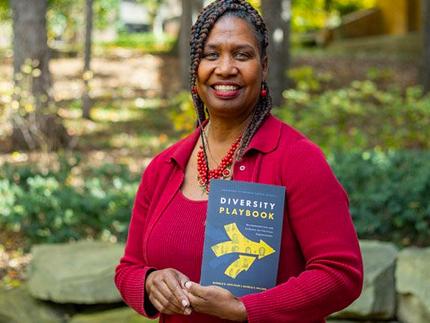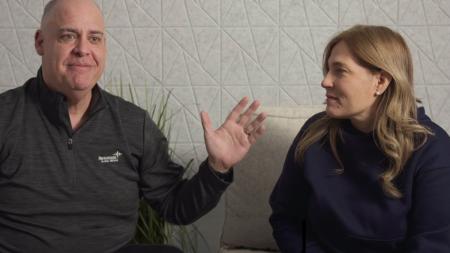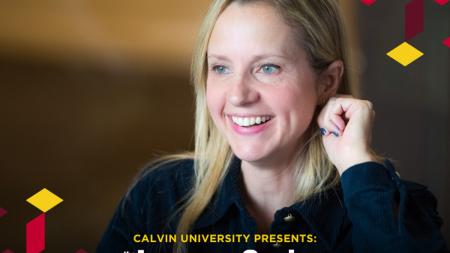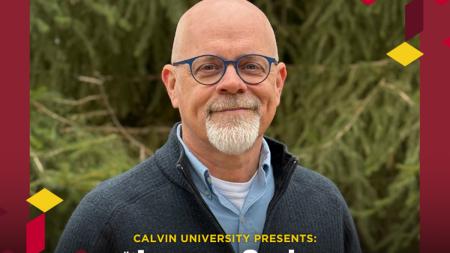Calvin Diversity Leader Helps Script Playbook

Michelle Loyd-Paige, executive associate to the president for diversity and inclusion, is helping the Calvin University community lean further into its institutional core value of diversity and inclusion. And she is not stopping there.
Rev. Dr. Loyd-Paige and Rev. Michelle Williams recently co-authored Diversity Playbook: Recommendations and Guidance for Christian Organizations. In the book, says a review, the co-authors “build on their years of experience in Christian higher education and share pitfalls to avoid and plans that can extend God’s ministry of reconciliation to everyone.”
News & Stories writer Matt Kucinski sat down with Loyd-Paige to discuss her new book that was released on Wednesday, Nov. 2, 2021.
Why did you write this book? Why now?
We wrote this book because we felt like our experiences, expertise, and insights could be of assistance for Christian organizations and for those within Christian organizations striving to either lead or enhance institutional diversity efforts. We are friends. We are both diversity professionals. We love the church and are committed to supporting Christian organizations with our time and talent. We wrote this book as a word of encouragement. Much like the way Luke and Paul wrote letters of encouragement and instruction to the early church. The early church struggled with diversity. And today, our nation and many of our Christian organizations are struggling to achieve their desired diversity and inclusion goals.
While many would point to the racial unrest of the Spring and Summer of 2020 as an awakening to disunity among Christians, the truth of the matter is that Christian organizations have been struggling to set, execute, and achieve diversity goals for decades. But there is something about this moment in time, it seems as if Christian organizations want to move towards a reconciliation that is beyond words. In the aftermath of the killing of George Floyd, many organizations posted statements affirming the value of diversity and sought to hire chief diversity officers. Because we have been doing this work for decades, we see ourselves as “big sisters” or guides for those in the early stages of their journey. We wrote this book as a way to expand our reach.
What do you want your readers to take away with them?
That diversity matters to God and therefore, it should matter to us. That all of us have been given this ministry of reconciliation; that is, reconciling creation back to God and to each other. We have been given this ministry. God has committed it to us, but it is from God. It really is a work of the heart. Diversity professionals are in the transformation business. Outliers, allies, and co-conspirators are in the transformation business. Christian organizations are in the transformation business. We are called to assist in changing hearts and broadening minds. We are called to help people think and love like Jesus. Systems do not change without a transformation. Jesus came in and upended an entire system with his message of love and redemption. We are called to do the same.
What fresh perspective does your book provide around a topic that can often lead to polarizing conversations?
We feel like we bring the calm in the midst of all the noise. We offer both truth and grace. We share our experiences – the good, the bad, and the ugly. We offer stories of real events and situations to illustrate our points – not just the results of research. We lived this book. This book was 36 years in the making. We both have experience working in or with Christian higher education, Christian non-profits, Christian K-12, and governing boards. Additionally, we are not prescribing “what” Christian organizations “should” do, rather we offer tools and guidance that will help organizations determine their next steps while keeping their context and priorities in mind.
We grieve that diversity has become the subject of polarizing conversations – that is, if you can even call some of those exchanges that happen conversations within the church. We grieve, but honestly, we are not surprised. One only has to look at the history of the church within the United States to see that issues of race, gender, and homosexuality have been polarizing issues for a long time.
Why do diversity efforts fail in organizations?
There are a number of reasons, but the top reason diversity efforts fail or are frustrated or are slow to happen is a lack of commitment by senior leadership. By senior leadership we mean the CEO, presidents, pastors, boards of trustees, advisory councils, and consistories – in other words, the people where the “buck” stops. The top decision makers. A commitment to diversity is more than a statement on a website. True commitment produces results. You can see the fruit of the commitment. Senior leadership should also recognize they need people around them to see the things they don’t see, understand the things they don’t understand about matters of diversity. No matter who you are or what your identity is you have limited vision. If all you know is your own experience, you’ll miss a whole lot of people. As a senior leader, if you don’t have people around you that will tell you the truth about disparities, hurts alienation, and the historical and institutional roots of discrimination in our nation AND our organizations, you’ll think everything is wonderful and great.
What makes diversity efforts successful?
There is no one thing. There are no “magic” bullets that will guarantee success. I have these little plastic bullets I found in a toy store that I keep on my desk. I give these to people and say that’s the only silver bullet they are going to get. There are no silver bullets in doing this work.
But, a few things that will make diversity efforts more likely to be successful are having a point person for making sure diversity and inclusion work happens. An organization needs a committed senior leadership and a chief diversity officer. A chief diversity officer is someone providing vision and guidance on how to do this work.
While diversity efforts are everybody’s responsibility, if there is not a designated person who is responsible – in consultation with others – for seeing that goals are set and accomplished, then nobody’s held accountable.
I also think having committed resources is important. By resources I mean financial, human, and symbolic resources. Here is an example of what I mean by a symbolic resource. When my office was moved across the hall from Michael’s [the president], that was significant. To be this close in proximity to the president’s office shows how important this work is and has facilitated many conversations between the president and I. Additionally, there must be a good and trusted relationship between the senior leadership and the person leading diversity efforts. President Le Roy, trusts me to speak about diversity efforts that demonstrate Calvin’s commitment, challenges us to do better in areas where we are lacking, and as rooted in a biblical and Reformed understanding. Because I am situated in the office of the president, I speak with the authority of the office of the president on matters of diversity.
Finally, you must play the long game. I think sometimes people quit too soon. I mean diversity professionals and people who want to see change. People will quit a job or on diversity efforts because things are not changing as soon as they want them to change. We live in this age of instant everything. Lately, there seems to be this idea that if you make a complaint that it’s automatically going to get solved. It’s not that simple. I wish it were. One of the advantages I’ve had is that I’ve been here [at Calvin] so long that I know how things used to be – very different from when I was a student in the late ‘70s and early ‘80s. A lot has changed. Yet, there is still a lot more work to do. I have learned how to live and work in the “not yet.” This is work that takes patience, time, grit, resilience, and trusting God with both the outcome and the process.
Related resources
The CRC Office of Race Relations offered a webinar with Loyd-Paige discussing her new book.
The Antioch Podcast is producing a four-part series (see episodes 161 & 162) on the Diversity Playbook.


